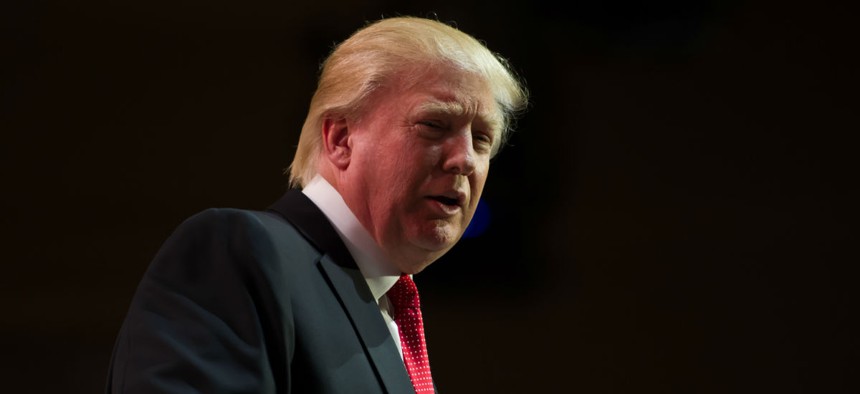
Christopher Halloran / Shutterstock.com file photo
Will Donald Trump Actually Matter in the 2016 Race?
The real-estate tycoon just announced he's running for president. He's not going to win the nomination, but he's going to be tough to ignore.
Donald Trump is not going to be president of the United States.
This the entire nation could probably agree on, even as he announced Tuesday his official bid for the White House.
"I have heard that a truly successful person, a really, really successful person, and even modestly successful, cannot run for public office. Just can't happen. And yet that's the kind of mind-set that you need to make this country great again," Trump said Tuesday from his announcement at Trump Tower in New York City. "So, ladies and gentlemen, I am officially running for president of the United States, and we are going to make our country great again."
Trump has his supporters, without a doubt, but his detractors are legion, including among Republicans. And though he could likely self-fund a campaign, that great wealth comes with an attitude that Americans have consistently told pollsters they'd like to keep confined to prime-time TV.
In a speech punctuated by cries of "We need Trump now!" and "We want Trump!," he said he'll be "the greatest jobs-president that God ever created," and said he'd make America more competitive on the international stage.
"When was the last time anybody saw us beating, let's say, China in a trade deal? They kill us. I beat China all the time, all the time," Trump said.
The now-candidate even addressed his financials during the speech.
"I'm using my own money. I'm not using the lobbyists, I'm not using donors, I don't care. I'm really rich," said Trump, who later on in the speech disclosed his net worth of, he says, well over $8 billion. "By the way, I'm not even saying that to brag—that's [the] kind of mind-set, that's the kind of thinking, you need for this country."
But Trump's unelectability doesn't necessarily mean he won't have an impact on the GOP presidential primary cycle—in fact, there are a few ways in which he most certainly will.
How The Donald could affect 2016:
1. Trump could poll high enough to kick a more typical—if less famous—candidate off the Fox and CNN debate stages. Fox has said it will determine which members of the Republican field will make the top-tier debate cutoff by evaluating the last five national polls ahead of the main event. CNN is following a similar plan for their first debate; candidates who aren't polling as well as others will participate only in a bottom-tier contest. If by name recognition alone Trump is pushed to the top of the qualifying polls—he made the top 10 late last month in a couple polls—he could take the place of a contender who actually has political experience. Name recognition matters.
2. A Trump candidacy is great news for the news. Trump is always good for a sound bite: He's unabashedly confident, speaks with what's at most a very thin filter, and has very little to lose.
During his announcement Tuesday, in what appeared to be a joke, Trump connected his business success in the United States with the Islamic State.
"Islamic terrorism is eating up large portions of the Middle East," Trump said. "They've become rich. I'm in competition with them. They just built a hotel in Syria. Can you believe this? They built a hotel."
Trump's idiosyncrasies make for imminently readable (and well-trafficked) news stories, of which there have been many. (Check out how Trump's search interest compares with that of Newt Gingrich, who actually ran, during the 2012 cycle.) Trump's promises during his Tuesday speech alone could spawn dozens of stories and news clips. He said he will: "repeal and replace the Big Lie, Obamacare"; "build a great, great wall on our southern border, and I will have Mexico pay for that wall" ("nobody builds walls better than me"); and "find the General Patton or … General MacArthur" in the U.S. military to fight the Islamic State.
3. In that way, he's able to throw the news cycle off track by vacuuming up airtime and making other candidates answer for him. If his fellow Republicans are forced to respond to his remarks (on, say, President Obama's place of birth—or Sen. Ted Cruz's), it'll be good news for headline-loving Trump, but an unwelcome distraction for his opponents.
… but why it won't matter for very long
1. He's able to throw the news cycle off track by vacuuming up airtime and making other candidates answer for him. No, this is not a copy-and-paste mistake: The same quality that could make him a force on the campaign trail suggests to voters that he is unserious. His quip about being wealthier than Mitt Romney is entertaining—and "almost assuredly true," according to The Des Moines Register—but it doesn't actually add anything to the larger debate. It's just another quote at which voters can chuckle as they open their wallets for another candidate.
2. Trump is essentially running for fun—and a possible ratings boost. This might be the first time Trump has formally declared a full-blown campaign for the presidency, but it's hardly the first time he has floated the idea—and been accused of doing so for less-than-honorable reasons. In the 2012 cycle, it was suggested he was prepping a run in order to boost ratings for Celebrity Apprentice, which, lo and behold, is struggling these days to attract an audience. NBC, which airs the show, is going ahead with next season's taping under the assumption that Trump will be a part of it. A quickie presidential run before filming starts in the fall, with the show set to air later next year, might be just the ticket for Trump to get eyeballs on his show. (In Trump's world, 2016 isn't just the year of a significant presidential election—it's also the year his Washington hotel on Pennsylvania Ave. is set to open. At this moment,trump2016.com redirects to the Trump International Hotel's website. He said Tuesday that it's "going to be the best hotel in Washington, D.C.")
3. Seventy-four percent. That's the number of Republican voters who said in a March poll that they could never see themselves voting for Trump. Even if Trump manages to convert a decent portion of those conservatives who are steadfastly against him, he'll still be basically nowhere as far as electability goes.
For all the unconventionality of Trump's announcement, he did stray into a typical campaign-speech territory on his closing note.
"Sadly, the American dream is dead," he said soberly, and with emphasis. "But if I get elected president, I'll bring it back bigger and better and stronger than ever before and we will make America great again."
Matt Berman contributed to this article.
(Image via Christopher Halloran / Shutterstock.com)







